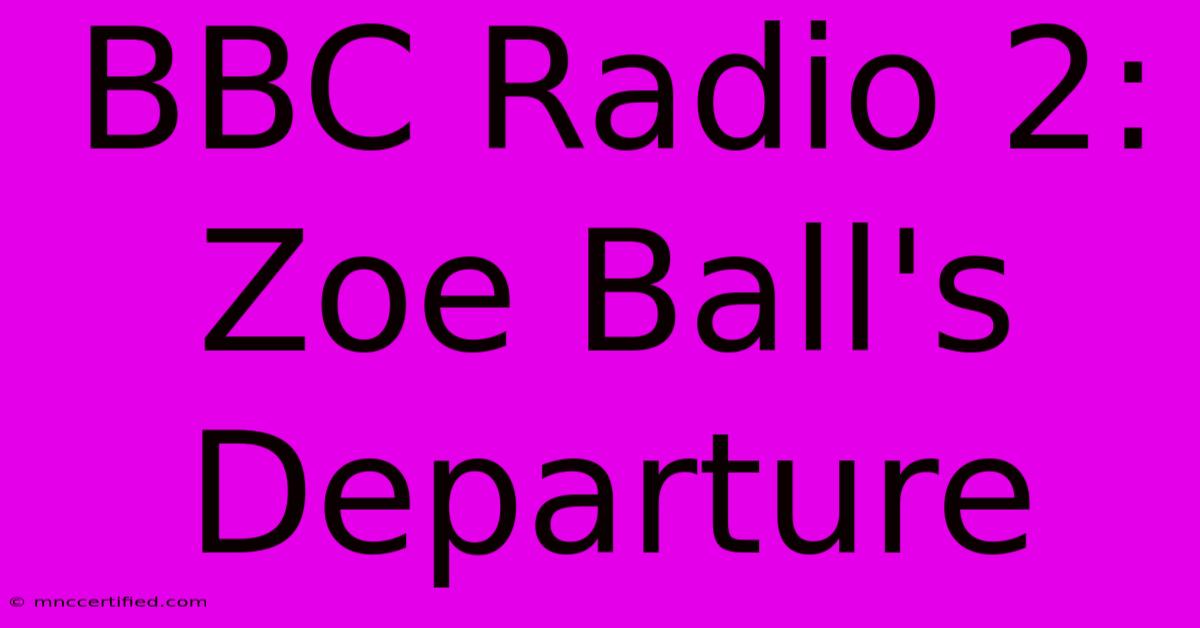BBC Radio 2: Zoe Ball's Departure

Table of Contents
BBC Radio 2: Zoe Ball's Departure - The End of an Era?
Zoe Ball's departure from BBC Radio 2 after a decade-long stint as a breakfast show host sent shockwaves through the broadcasting world. Her final show on 28th July 2023 marked the end of an era, leaving listeners and industry insiders alike pondering the future of the station and the legacy of one of its most popular presenters. This article delves into the circumstances surrounding her exit, exploring the reasons behind her decision and its potential impact.
Why Did Zoe Ball Leave BBC Radio 2?
While the official statement from the BBC was relatively vague, citing a mutual agreement to end her contract, speculation regarding Zoe Ball's departure has been rife. Several factors likely contributed to her decision:
The Demands of the Breakfast Show:
Presenting a daily breakfast show is notoriously demanding. The early starts, intense pressure to deliver consistently high-quality content, and the sheer volume of work involved can take a toll, even on the most experienced broadcasters. This relentless schedule likely played a significant role in Zoe's decision.
Creative Differences and Future Aspirations:
There have been whispers of creative differences between Zoe and BBC Radio 2 management. While unsubstantiated, these rumors hint at a potential desire for more creative freedom or a shift away from the constraints of a long-running, established format. Zoe may have been looking for new challenges and opportunities to pursue her diverse talents beyond the breakfast show format.
Work-Life Balance:
Maintaining a successful career while juggling personal life responsibilities is a constant challenge. Zoe Ball is a mother, and prioritizing family life may have influenced her decision to step down from such a demanding role. This speaks to a broader trend in the industry, with many professionals prioritizing wellbeing and a healthy work-life balance.
The Impact of Zoe Ball's Departure on BBC Radio 2:
Zoe Ball's departure leaves a significant void in BBC Radio 2's programming. Her show consistently attracted high listenership figures, making her a valuable asset to the station. Her exit will undoubtedly impact:
-
Listenership: While BBC Radio 2 boasts a strong roster of presenters, a dip in listenership is possible, at least temporarily, as listeners adjust to a new breakfast show host. The station's success in retaining its audience will depend heavily on the choice of her successor.
-
Programming Changes: The station will need to re-evaluate its breakfast show programming, considering listener preferences and the overall strategic direction of the station. This may involve significant changes to the show's format, tone, and musical choices.
-
Competition: The vacancy created by Zoe's departure presents a significant opportunity for competing radio stations to attract new listeners.
Who Will Replace Zoe Ball?
The selection of Zoe Ball's replacement is crucial for BBC Radio 2's future. The station will likely consider a range of factors, including experience, audience appeal, and ability to maintain the station's established brand identity. Speculation is rife, with various names being mentioned in the media, but the final decision remains with the BBC.
Zoe Ball's Legacy:
Regardless of the reasons behind her departure, Zoe Ball leaves behind a significant legacy at BBC Radio 2. Her decade-long tenure as a breakfast show host cemented her status as a popular and respected broadcaster, shaping the sound and style of the station for years to come. Her contributions will undoubtedly be remembered by both listeners and her colleagues.
This unexpected departure from BBC Radio 2 signifies a moment of change for the station. The success of her replacement and the station's overall adaptation to this significant shift will be closely watched in the coming months and years. The legacy of Zoe Ball's time on air, however, is undeniably etched into the station's history.

Thank you for visiting our website wich cover about BBC Radio 2: Zoe Ball's Departure. We hope the information provided has been useful to you. Feel free to contact us if you have any questions or need further assistance. See you next time and dont miss to bookmark.
Featured Posts
-
New York Marine General Insurance
Nov 19, 2024
-
100 000 North Korean Troops For Russia
Nov 19, 2024
-
2024 Huda Beauty Black Friday Guide
Nov 19, 2024
-
Bo Nixs Broncos Career Early Assessment
Nov 19, 2024
-
Chinese Officials Eject British Journalists
Nov 19, 2024